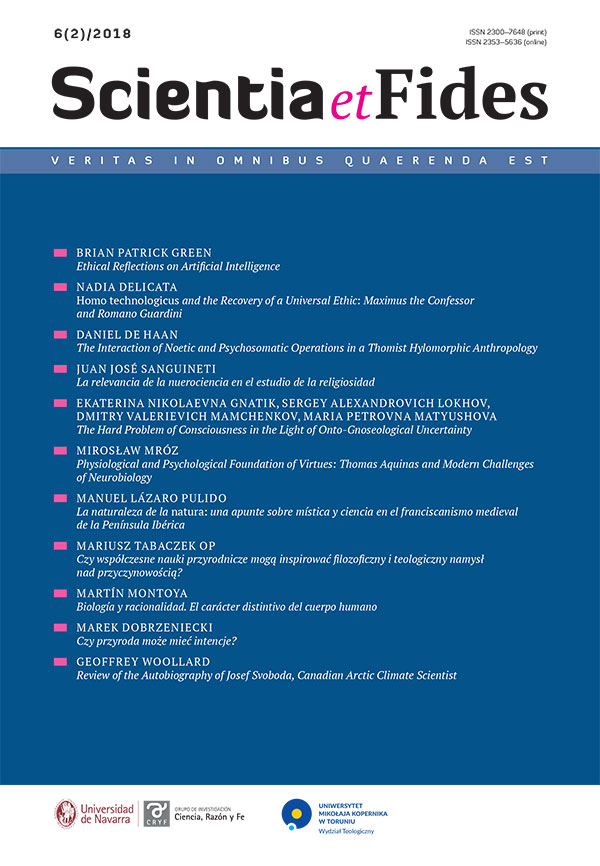The Hard Problem of Consciousness in the Light of Onto-Gnoseological Uncertainty
Palabras clave
hard problem of consciousness, consciousness and brain, subjective reality, qualia, onto-gnoseological uncertaintyResumen
Purpose: The main purpose of this article is to show that the paradigm of viewing the ‘hard problem’ of consciousness in analytic philosophy makes it a pseudo-problem rather than a ‘hard problem’. The objectives of this research included showing the reasons for the authors’ thesis, demonstrating the irreducibility of consciousness as a special layer of reality, and proposing a way to overcome these difficulties.
Design/methodology/approach: In this article, the ‘hard problem’ of consciousness is viewed from the standpoints of the transcendental-phenomenological and dialectical approaches and is analyzed through the prism of the principle of onto-gnoseological uncertainty.
Findings: It is shown that the way of formulating the ‘hard problem’ in the analytical philosophical tradition inevitably makes it a pseudo-problem. At the same time, with the consistent realization of the principle of onto-gnoseological uncertainty, the antinomy of solutions to the problems of consciousness is eliminated, which opens up a way to a productive solution of problems related to the interpretation of consciousness both in natural sciences and in philosophy.
Originality/value: This research reveals the methodological potential of applying the principle of onto-gnoseological uncertainty to the problems that arise in modern philosophy in connection with the achievements of natural sciences.
Citas
Bielas, Jacek. 2017. “The View from Within the Brain: Does Neurofeedback Close the Gap?” Journal of Consciousness Studies 24 (9–10): 133–155.
Carruthers, Glenn, Schier, Elizabeth. 2017a. “Introduction: The Hard Problem of Consciousness.” Topoi 36 (1): 1–3.
Carruthers, Glenn, Schier, Elizabeth. 2017b. “Why are We Still Being Hornswoggled? Dissolving the Hard Problem of Consciousness.” Topoi 36 (1): 67–79.
Chalmers, David. J. 1997. The Conscious Mind. In Search of a Fundamental Theory. Oxford: Oxford University Press.
Dennett, Daniel. 1991. Consciousness Explained. Boston: Littl Brown and Co.
Descartes, Rene. 1989. Writings in two volumes. Vol. 1. Moscow.
Dubrovsky, David I. 2012. “The Subjective Reality and the Brain. On the Question about the Half-Century Experience of Developing the ‘Hard Problem of Consciousness’ in Analytic Philosophy.” In Epistemology: Development Perspectives, by Lektorskiy, V.A., 229–273. Moscow: «Kanon+».
Hendry, Robin F. 2006. “Is There Downward Causation in Chemistry?” In Philosophy of Chemistry, by edited D. Baird et al., 173–191. Boston: Springer.
Horst, Steven. 2014. “Beyond Reduction: From Naturalism to Cognitive Pluralism.” Mind & Matter 12 (2): 197–244.
Kuznetsov, Anton V. 2014. “Cognitive Research and the Problem of Mental Causality.” Questions of Philosophy 3: 133–143.
Lamza, Lukas 2014. “Six Phases of Cosmic Chemistry.” Hyle – International Journal for Philosophy of Chemistry 20 (1): 165–192.
Lebedev, Vladimir I. 2002. Psychology and Psycholpathology of Loneliness and Group Isolation. Moscow: Unity.
Mamchenkov, Dmitry V. 2014. Objectivity and Historicism. Moscow: RUDN.
Mamchenkov, Dmitry V. 2017. „The ‘Hard Problem’ in Analytic Philosophy.” Newsletter of RUDN. Series “Philosophy” 21 (2): 222–229.
McBride, Raymond. 2014. “Towards a Sublime State of Consciousness.” Journal of Consciousness Studies 21 (11–12): 19–40.
McClelland, Tom. 2017. “The Problem of Consciousness: Easy, Hard or Tricky?” Topoi 36 (1): 17–30.
Mednikov, Boris M. 1982. Axioms of Biology. Moscow: Znanie.
Menon, Sangeetha. 2014. “Beginnings: Biological and Philosophical Accounts of Consciousness.” In Brain, Self and Consciousness, edited by S. Menon, 37–60. New Delhi: Springer.
Metlov, Vladimir I. 2003. „A Complex Approach to the Problem of Consciousness.” In Proceedings of the Scientific Conference “Philosophy of Consciousness: History and Modernity’’ dedicated to the memory of A.F. Gryaznov, Professor at Moscow State University (1948–2001), 247–250. Moscow: “Sovremennye Tetradi” Publishing House.
Naidysh, Viacheslav M. 2017. “Mythmaking in the Activity of Consciousness.” Questions of Philosophy 5: 26–35.
Russel, Bertran. 1999. Philosophy of Logical Atomism. Tomsk: Vodoley.
Sartre, Jean-Paul. 2002. Being and Nothingness: An Essay on Phenomenological Ontology. Moscow: TERRA-Book Club Republic.
Searle, John. 2002. A Re-Discovery of the Mind. Moscow: Idea-Press.
Smith, Cristopher U. M., Whitaker, Harry. 2014. Brain, mind and consciousness in the history of neuroscience. Dordrecht: Springer.
Smith, Roger. 2015. “History and the hard problem.” Metascience 24 (3): 413–416.
Smythies, John. 2017. “The Role of Brain Mechanisms in the Generation of Consciousness.” Journal of Consciousness Studies 24 (1–2): 254–263.
Swaab, Dick. 2014. We are Our Brains: From the Womb to Alzheimer's. St. Petersburg: Ivan Limbakh Publishing House.
Tegmark, Max. 2015. “Consciousness as a State of Matter.” Chaos, Solitons & Fractals 76: 238–270.
Tsou, Jonathan Y. 2013. “Origins of the Qualitative Aspects of Consciousness: Evolutionary Answers to Chalmers’ Hard Problem.” In Origins of Mind, edited by Liz Swan, 259–269. Dordrecht: Springer.
Varkhotov, Taras A. 2003. “Cartesian Anthropology as the Epistemological Framework of Modern Philosophy of Consciousness.” In Proceedings of the Scientific Conference “Philosophy of Consciousness: History and Modernity’’ dedicated to the memory of A.F. Gryaznov, Professor at Moscow State University (1948–2001), 30–41. Moscow: “Sovremennye Tetradi” Publishing House.
Wittgenstein, Ludwig. 1994. “Philosophical Studies.” In Philosophical Works. Moscow: Gnosis.
Descargas
Publicado
Cómo citar
Número
Sección
Licencia
CC BY ND 4.0. The Creator/Contributor is the Licensor, who grants the Licensee a non-exclusive license to use the Work on the fields indicated in the License Agreement.
- The Licensor grants the Licensee a non-exclusive license to use the Work/related rights item specified in § 1 within the following fields: a) recording of Work/related rights item; b) reproduction (multiplication) of Work/related rights item in print and digital technology (e-book, audiobook); c) placing the copies of the multiplied Work/related rights item on the market; d) entering the Work/related rights item to computer memory; e) distribution of the work in electronic version in the open access form on the basis of Creative Commons license (CC BY-ND 3.0) via the digital platform of the Nicolaus Copernicus University Press and file repository of the Nicolaus Copernicus University.
- Usage of the recorded Work by the Licensee within the above fields is not restricted by time, numbers or territory.
- The Licensor grants the license for the Work/related rights item to the Licensee free of charge and for an unspecified period of time.
FULL TEXT License Agreement
Stats
Number of views and downloads: 750
Number of citations: 0



